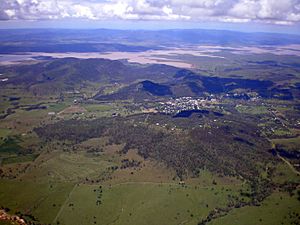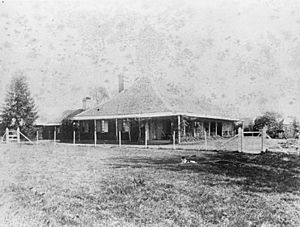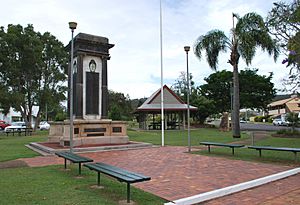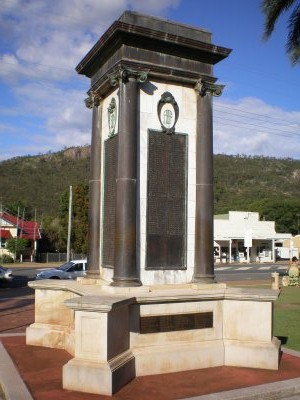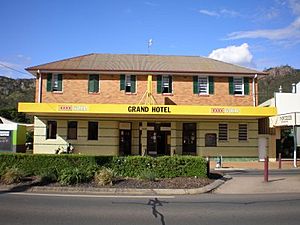Esk, Queensland facts for kids
Quick facts for kids EskQueensland |
|||||||||||||||
|---|---|---|---|---|---|---|---|---|---|---|---|---|---|---|---|
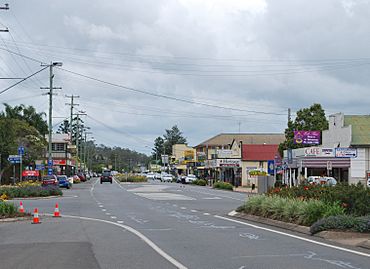
Main street of Esk, the Brisbane Valley Highway
|
|||||||||||||||
| Population | 1,641 (2021 census) | ||||||||||||||
| • Density | 27.534/km2 (71.31/sq mi) | ||||||||||||||
| Established | 1872 | ||||||||||||||
| Postcode(s) | 4312 | ||||||||||||||
| Area | 59.6 km2 (23.0 sq mi) | ||||||||||||||
| Time zone | AEST (UTC+10:00) | ||||||||||||||
| Location |
|
||||||||||||||
| LGA(s) | Somerset Region | ||||||||||||||
| County | Cavendish | ||||||||||||||
| Parish | Esk | ||||||||||||||
| State electorate(s) | Nanango | ||||||||||||||
| Federal Division(s) | Blair | ||||||||||||||
|
|||||||||||||||
Esk is a small country town in the Somerset Region of South East Queensland, Australia. It's a lovely place where 1,641 people lived in 2021. Esk is known for its beautiful scenery and friendly community.
Contents
Where is Esk?
Esk is about 64 kilometers (40 miles) northwest of Ipswich. You can find it along the Brisbane Valley Highway. The town got its name from the River Esk in Scotland and England. Esk is also the main office center for the Somerset Region.
A Look at Esk's History
The land around Esk was first explored by Captain Patrick Logan in 1830. The town started because of nearby copper mines at Eskdale and Cressbrook Creek. Settlers began moving into this area in the 1840s.
Early Buildings and Services
The first post office in Esk opened on 1 February 1874. It was first called Mount Esk Post Office. Later, in 1881, its name was changed to Esk.
Mount Esk State School opened its doors on 1 November 1875. This school was also renamed Esk State School in 1887.
A church called the Esk Primitive Methodist Church opened on Sunday 25 November 1883. It was a timber church. Later, it became the Esk Methodist Church. A new church building was built in 1907.
In 1886, a Brisbane Valley railway line reached Esk. This helped the town grow. Several sawmills were built, and a butter factory opened in 1904. The timber industry became less important after the 1920s.
St Agnes' Anglican Church was officially opened on Monday 28 October 1889.
Remembering the Past
On 30 November 1920, the foundation stone for the Esk War Memorial was laid. This memorial was built to remember the people from the area who fought in the First World War. It lists the names of 462 people who joined the war. It also has the names of 83 local men who died.
The war memorial stands in Esk Memorial Park. This park also has a memorial for Captain Logan. He was exploring the Brisbane Valley in 1830 when he was murdered.
In July 1941, a Lutheran church was opened in Esk.
From the 1960s, dairy farming became less common. This made Esk less important as a big country center. The Esk Library opened in 2009.
During the 2010–11 Queensland floods, the center of Esk was flooded. This happened when Redbank Creek overflowed for the first time ever recorded.
How Many People Live in Esk?
In 2006, about 1,166 people lived in Esk. By 2011, the population grew to 1,755 people. In 2016, there were 1,698 people. The most recent count in 2021 showed 1,641 people living in Esk.
Special Places in Esk
Esk has several places that are important to its history. These are called heritage-listed sites:
- Esk War Memorial, Ipswich Street: This memorial honors those who served in wars.
- St Agnes Anglican Church and Rectory, Ipswich Street: A historic church and its rectory.
- St Andrews Presbyterian Church, Ipswich Street: Another important historical church.
What Esk is Known For
Esk is a small town that helps support a rich farming area around it.
Schools in Esk
Esk State School is a government primary school for students from Prep to Year 6. It's located at 49 East Street. In 2017, the school had 172 students.
There are no high schools directly in Esk. Students usually go to Toogoolawah State High School in Toogoolawah. Other options are Lockyer District High School in Gatton or Lowood State High School in Lowood.
Local Services and Fun Places
The Somerset Regional Council runs a public library at 19 Heap Street. You can borrow books and use computers there.
The Esk branch of the Queensland Country Women's Association meets at 5 Heap Street.
Esk Uniting Church is at 78 Ipswich Street. It's part of the Brisbane Valley Uniting Church.
The Esk Post Office is located at 97 Ipswich Street. Esk also has a local hospital and a racecourse.
Things to Do Near Esk
There are many fun places to visit near Esk! You can go to Lake Somerset and Lake Wivenhoe. These lakes were made by dams and offer lots of activities. You can go camping, boating, canoeing, fishing, and skiing.
You can also explore Ravensbourne and Crows Nest National Parks. The historic Bellevue Homestead is also in the area. Close by are the peaks of Glen Rock and Mount Esk, great for exploring nature.
Media in Esk
Esk has a Christian radio station that you can listen to on FM 87.6 MHz.
Famous People From Esk
- Douglas Berry (1907–1957): He was a butcher and later became a politician in the 1950s.
- Roderic Dallas (1891–1918): A brave fighter pilot during the First World War.
- The Kransky Sisters: A funny music group who often say they are "from Esk, in Queensland" before their shows.
- Henry Newton (bishop) (1866–1947): An Anglican bishop who worked in different parts of the world.
 | George Robert Carruthers |
 | Patricia Bath |
 | Jan Ernst Matzeliger |
 | Alexander Miles |



